/
Marriage is a Story of Growth, Not a Fairytale Ending
[rt_reading_time label=”Reading Time:” postfix=”minutes” postfix_singular=”minute”]
I wasn’t thinking about a what makes a healthy marriage on my wedding day.
The questions of how our relationship would grow, change, and deal with conflict over the years were far from my mind. In fact, I was doing my best to ignore all the challenges that lay ahead for us.
I had just flown in from boot camp and as an extremely low-ranking private in the military I had pretty much handed over the control of my future to strangers.
I had little say in the direction or location of my future days.
How our brand-new marriage was going to survive the hardship, distance and uncertainty of military life was something I had no answer for.
All I knew was that:
- I wasn’t going to be lonely anymore.
- I wasn’t going to be misunderstood.
- I might still have a lot of problems, but this marriage wasn’t going to be one of them.
- When it came to this relationship, my problems were over.
(Activate the painfully naive alarm)
I had no idea that the real work of marriage had just begun.
- Why “Happily Ever After” Doesn’t Work in Real Marriage
- The Real Marriage Story Starts After the Wedding Day
- The Myth of "Happily Ever After"
- Why Every Marriage Has Problems — and Why That’s Not a Bad Thing
- Why Growth in Marriage Comes Through Overcoming Struggles
- Supporting Personal Growth in Your Relationship – Character Arcs
- Daily Habits That Build a Healthy Marriage Over Time
- Embracing Change in Long-Term Relationships
- Your Marriage Is a Growth Story, Not a Fairytale Ending
- What Next?
Why “Happily Ever After” Doesn’t Work in Real Marriage

When you’re first starting out, your marriage can seem like a Cinderella story.
- You’ve passed all the challenges.
- Solved all the riddles.
- There might be some glass footwear involved.
It’s the culmination of an adventure, often started years ago.
And now you’re walking off into the sunset with your prince.
(or Sandra Bullock, if you are Keanu Reeves in the movie Speed – the principle is the same)
There is nothing left to come between the two of you, now that you have found each other.
- Your bliss is complete
- The hopeful music fades in
- The credits start rolling down the screen
There is nothing left in this fairly-tale ending but except to drift off into your Happily Ever After.
The Real Marriage Story Starts After the Wedding Day
Happily Ever After sounds great, until you try it.
Then you discover pretty quickly that there are many things that are prone to come between you and your mate:
- Different financial priorities
- Clashing assumptions and traditions
- In-laws
- Favorite science fiction franchises (Star Wars vs Star Trek aint no joke)
Slowly the realization dawns on you. The adventure didn’t end with the wedding.
That was only the prologue – the short introductory piece that sets the tone for the longer and more involved story.
Now you find yourself thrust into an all-new story.
With adventures to accept.
Challenges to face.
And legacies to build.
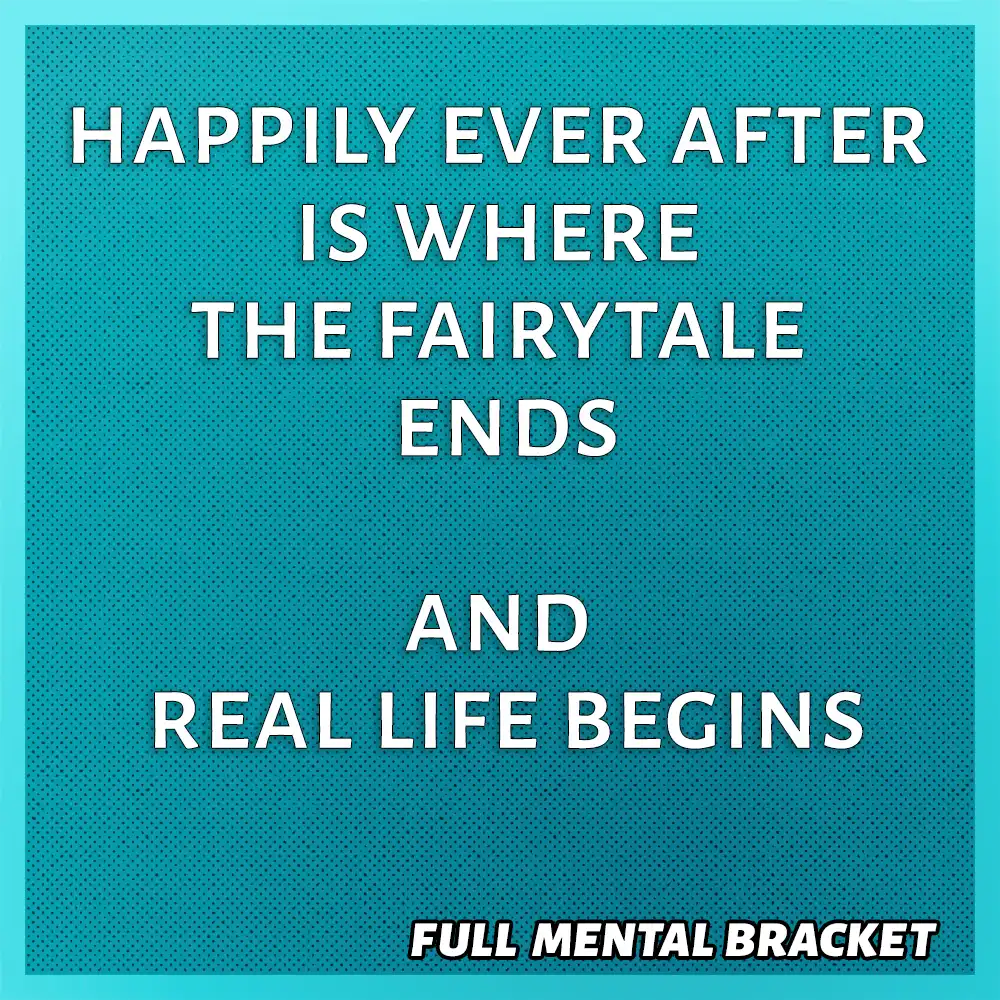
Happily Ever After is where the fairy-tale ends—and real life begins
And although as a couple you make quite the team, it’s going to take more than just the two of you to form a tribe strong enough to see this story through.
Let’s look at what else you might need.
The Myth of “Happily Ever After”
Happily Ever After is a convenient way to end a fairly-tale.
After the storyteller has taught all the lessons of the story and the characters are no longer needed, they can be neatly retired to some post-story sanctuary where they are never bothered by problems again.
They get shuffled off-stage and never thought of until the next telling.
But life isn’t a fairy-tale.
Yet, some people still approach their real-life relationships with a Happily Ever After mindset.
They see their relationship, or even their partner, as a prize. A reward they have earned by facing problems earlier in life. And now in this golden age of romance, problems are all in the past.
As you might imagine, this belief sets you up for disappointment.
Lot’s of it.
When you see yourself as having earned a romantic rest from your problems it can be really confusing when problems show up anyway—right in the middle of your perfect new life together.
It feels unfair.
It may feel like your relationship is broken in some way.
It may feel like you somehow failed to find your one true, magical, soul-mate, “you complete me” Mythical Super Spouse.
These are all wrong answers, based on the assumption that problems are always bad.
Why Every Marriage Has Problems — and Why That’s Not a Bad Thing
Although people like to think that the best life is one without problems, that is fairly-tale thinking.
Life is a collection of problems to solve.
Anyone who tells you otherwise is probably in a Hallmark movie
Karl Popper had whole riff on this. He said the secret of both science and philosophy was to find an exciting problem and fall in love with it.
(I guess this makes my wife a philosopher.)
Even though most people get hung up on the quantity of their problems, it’s the quality of your problems that really counts.
Once upon a time you were alone and had no one to share your life with – that was a sucky problem
Now you have to figure out how to negotiate your shared life with your partner – a better problem
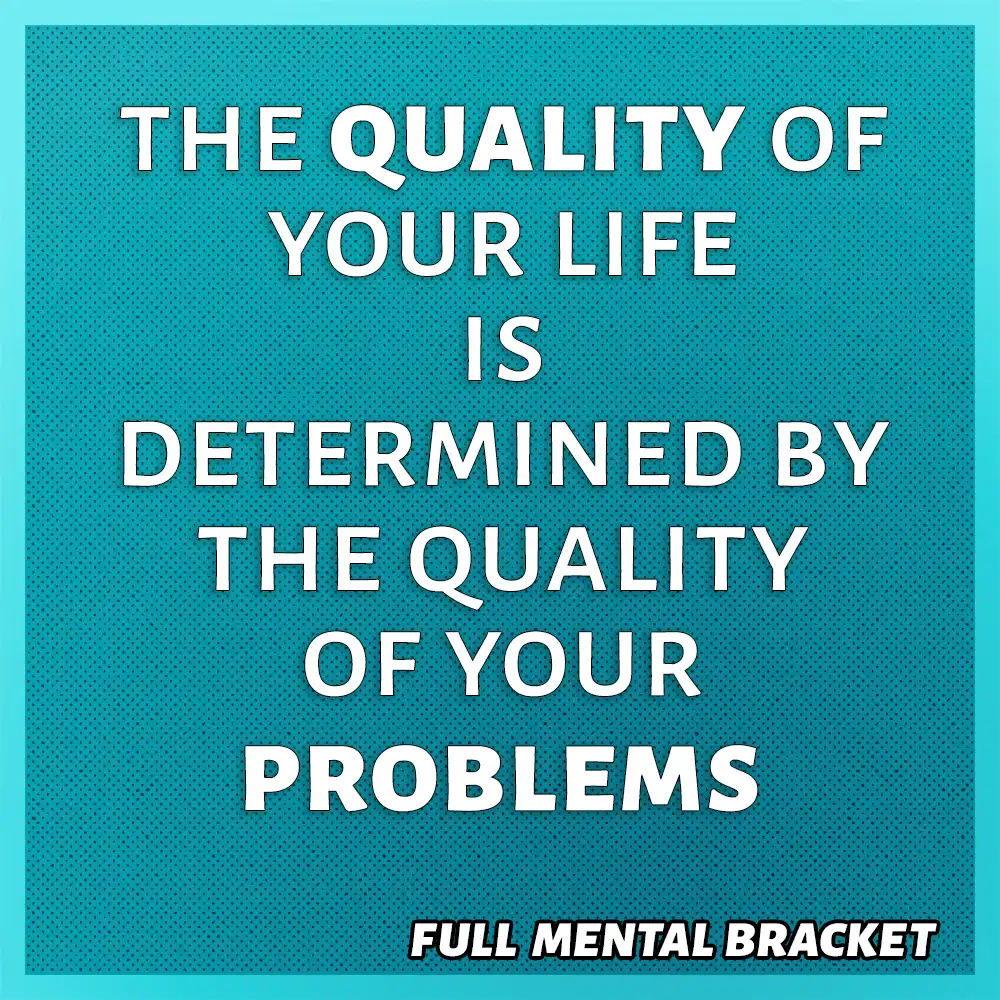
The quality of your life is determined by the quality of your problems.
It’s not whether or not you have problems
It’s how capable you feel about solving those problems. And the fulfillment and satisfaction you get from solving these problems.
Think about it. People never have too many of the right kind of problems.
In fact, people will go out of their way and hand over their money to get ahold of even more problems
- A video game is a series of problems to solve
- A jigsaw puzzle is a series of problems to solve
- A painting, a story, or any other work you create is a series of problems to solve
And in the same way, a growing marriage is a series of problems that hopefully improve in quality as you go along.
And if you do it right, this kind of marriage can be just as satisfying as creating a work of art.
Why Growth in Marriage Comes Through Overcoming Struggles
As in other aspects of life, the challenges and struggle we face in our marriage are the very things that allow us to grow.
Like a kettle ball or barbell, wrestling with our struggles feels a lot like work.
It often feels uncomfortable.
Even painful.
But it is how we build strength and maturity. Facing challenges is the path of transformation.
This is no winning without the work.
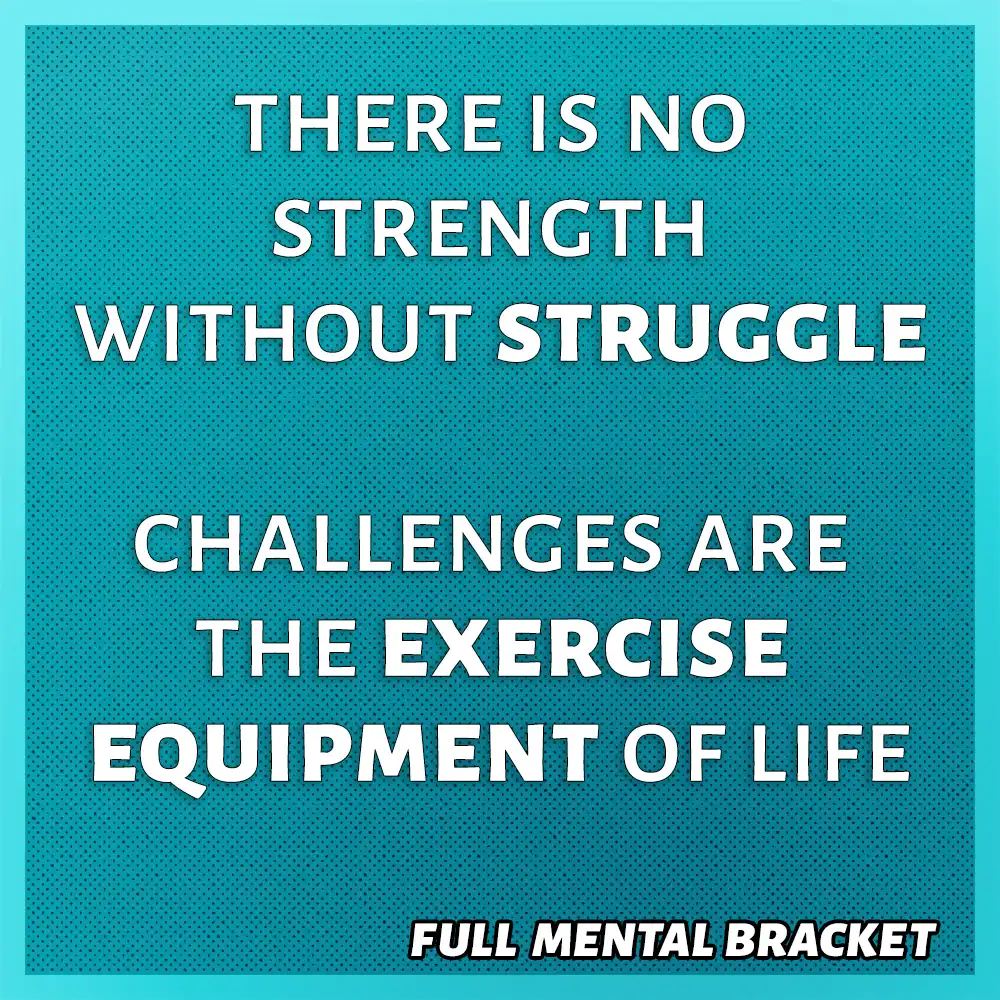
There is no strength without struggle—challenges are the exercise equipment of life
I don’t know about you, but I want to do more than just survive my marriage.
I want to thrive in it
And thrive because of it
In other worlds, I want my marriage to be an opportunity for growth.
🎧 Click here to listen to a deeper discussion of this topic
Supporting Personal Growth in Your Relationship – Character Arcs
In stories, every relatable character has a character arc – a path of challenge and change that serves to grow and mature them as the story progresses.
In a marriage there are 3 character arcs:
Partner one will have a series of struggles and successes that demonstrate the lessons they have learned and the ones they have yet to learn.
Partner two will have a related, but different path of change. One that illustrates what they have overcome and what they working to overcome.
These two arcs are unlikely to line up very much.
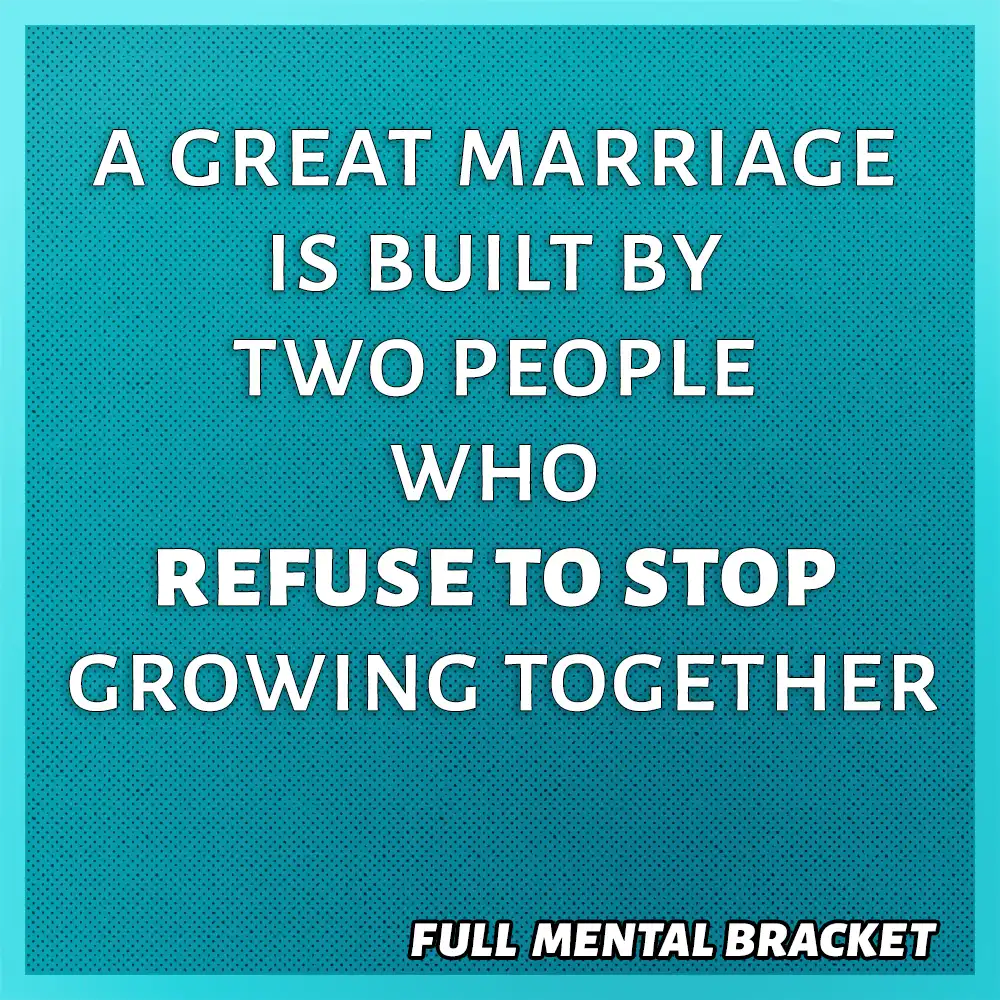
A great marriage is built by two people who refuse to stop growing together
When your partner is really struggling with an issue, you might be taking a victory lap around the same issue, rehearsing your imaginary interview with Oprah, and going over in your mind how awesome you are for totally mastering that problem.
In situations like this you might be tempted to look down on your partner. To scold them or act as if you have it all together and you’re just waiting on them to catch up.
But an argument like that always involves a certain convenient forgetfulness:
- Forgetfulness of how all the work it took for you to overcome the issue
- Forgetfulness of the many other issues you have NOT mastered
- Forgetfulness of the issues that your partner HAS mastered but you are still struggling with
When you keep these things in mind, it lends a helpful humility and makes it easier to have grace for your partner as your work together to face your struggles.
The third character arc belongs to the marriage itself. It is a combination of both partner arcs with some moves that are all its own.
Daily Habits That Build a Healthy Marriage Over Time
Now an arc just means change over time. An arc can be positive of negative.
You can grow and improve.
Or you can retreat into immaturity and fear.
One of the best ways to get your marriage arcing in the right direction is to make small regular investments in it.
Just like money in a good investment compounds over time, so does a healthy relationship.
A big bouquet of flowers or a grand romantic gesture a couple times a year may seem exciting, but it doesn’t build a marriage nearly as much as:
- Owning your struggles instead of blaming your mate
- Talking calmly rather than yelling and losing your temper
- Giving your partner the benefit of the doubt instead assuming they are out to get you
- Having patience with your partner
- Cultivating gratitude for your relationship
- Cultivating gratitude for the problems in your relationship (Why? Keep reading)
These things may not feel very satisfying at the time.
They may feel more like a sacrifice.
But that’s what an investment is. A small sacrifice today for greater return in the future.

The little things you do every day are what shapes your marriage—not the grand gestures
Remember the three arcs?
Your investments build and support all three.
You invest in the arc of your partner not just by regular demonstrations of affection, but also with encouragement, practical advice, and loving accountability. Be their cheerleader, coach, and partner as they pursue their goals.
You invest in the arc of your marriage with deliberate relationship building activities. Private getaways for the two of you, shared activities, and even taking advantage of the wisdom of more experienced couples (sometimes known as…counseling)
You invest in your own arc when you take on new goals and adventures, learn new skills and mindsets to better handle your challenges, and work towards a legacy that bigger than yourself.
Embracing Change in Long-Term Relationships
The thing about growth is that you change.
It’s right there in the definition.
The kind of growth and transformation that makes your marriage a strength also means that your partner will change and evolve over time.
That’s a good thing for both of you, but it can feel scary if you are not expecting it.
One time I was having a disagreement with my wife, and she called out, “You’re not the man I married.”
The statement kind of hung there for a minute as we looked at each other.
Then I agreed with her.
And I asked if she really wanted to go back to being married to twenty-year-old me.
All the fears and insecurity.
All the immaturity.
All the struggles still ahead needed to grow out of it.
After talking it over for a while we agreed that we both were healthier, more mature versions of ourselves than when we first married.
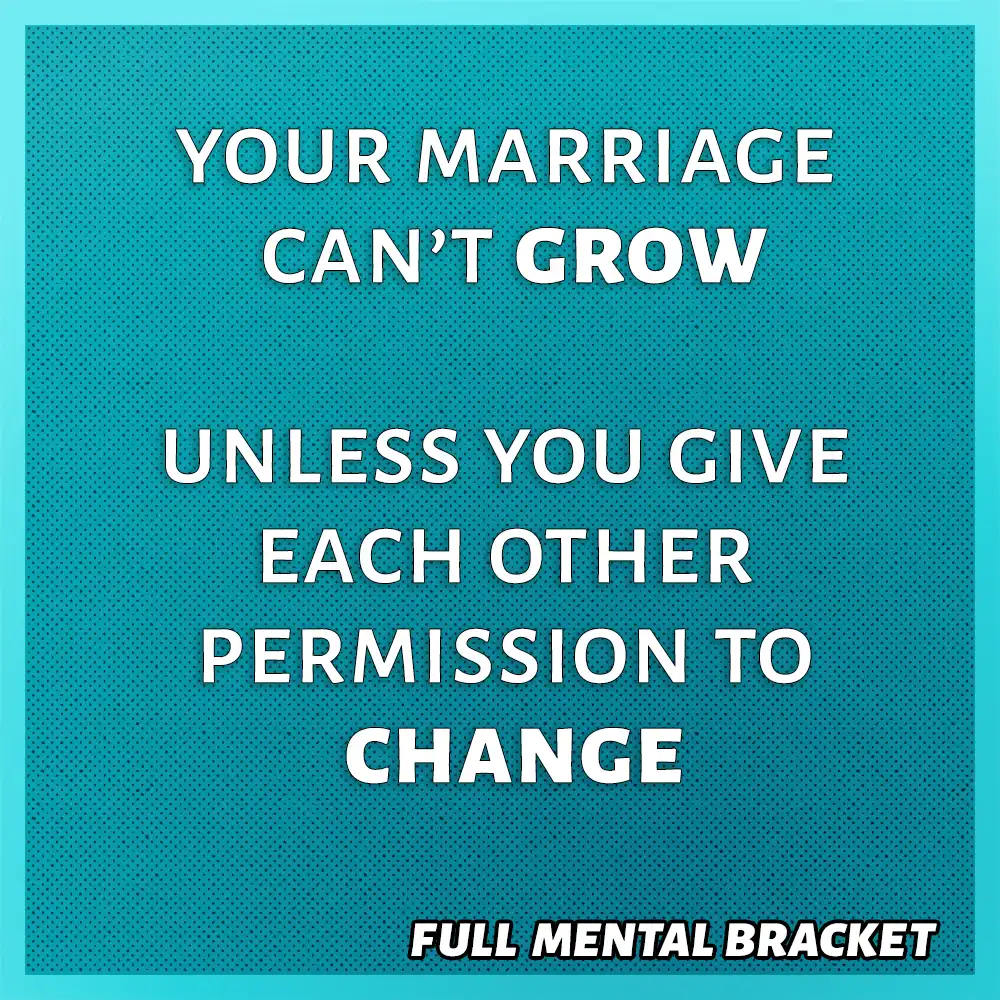
Your marriage can’t grow unless you give each other permission to change
And even though it can feel uncomfortable, we have to have the grace to let each other grow.
In marriage, growing requires you to not just keep a loose grip on your own identity, but on your partner’s identity as well. You have to give them the room to grow.
Your Marriage Is a Growth Story, Not a Fairytale Ending
As we’ve seen, Happily Ever After is just lazy storytelling. In the real world such a state is impossible because it requires that things never change.
But life is change.
And our story is all the ways we change to keep up with life, becoming better and better version of ourselves.
Your marriage is not a prize for finishing the story.
It is a story in its own right.
An adventure you answer with challenges to overcome and opportunities for growth and maturity.
If are willing to put in the small daily investments, that story can be powerful, inspiring, and incredibly rewarding.
What Next?
Want a more personal take on the challenges of marriage and personal growth?
Listen to our podcast on this, where I sit down with my wife Camille and we discuss 35+ years of marriage struggles and growth.
Real stories, real talk, real good.
🎧 Click here to listen to hear the podcast – audio and video versions included.

Brent Diggs is a generalist with a broad set of interests, experiences, and skills. He is passionate about cognitive bias, social psychology, and all the irrational forces that convince us we are rational. His work has been featured in The Ominous Comma, Mind Over Memphis, and over 1500 product tutorials.
Oh yeah, he’s also the host of the Full Mental Bracket podcast.